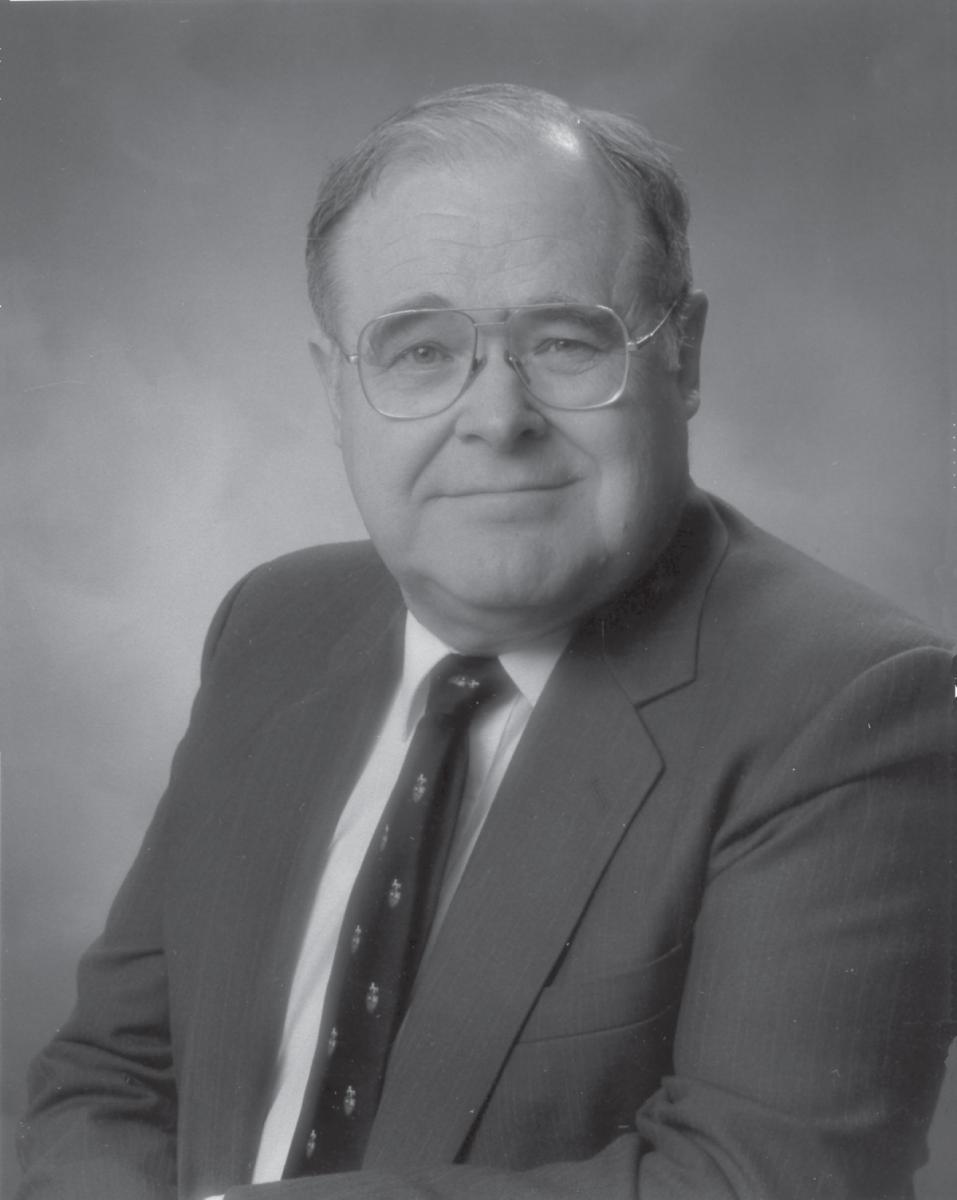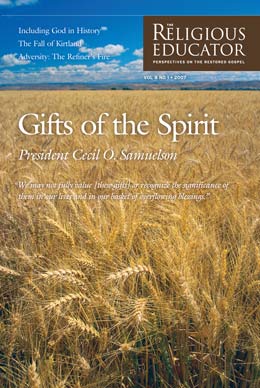How Including God in History Can Help in Research and Teaching in a Latter-day Saint Environment
Alexander B. Morrison
Elder Alexander B. Morrison, “How Including God in History Can Help in Research and Teaching in a Latter-day Saint Environment,” Religious Educator 8, no. 1 (2007): 9–12.
Elder Alexander B. Morrison is an emeritus member of the First Quorum of the Seventy.
This address was given October 31, 2005, at a luncheon at Brigham Young University for contributors to Window of Faith: Latter-day Saint Perspectives on World History (Provo, UT: Religious Studies Center, Brigham Young University, 2004).
 Elder Alexander B. Morrison. Courtesy of Visual Resources Library. Copyright by Intellectual Reserve, Inc.
Elder Alexander B. Morrison. Courtesy of Visual Resources Library. Copyright by Intellectual Reserve, Inc.
More than two decades ago, President Boyd K. Packer gave a landmark address to Church religious educators at their annual symposium. The talk was entitled “The Mantle Is Far, Far Greater Than the Intellect.” In it, President Packer noted that historians, if they are not very wise, leave out of their professional studies the things of the Spirit. The next step soon follows: they leave spiritual things out of their lives. He concluded that “there is no such thing as an accurate, objective history of the Church without consideration of the spiritual powers that attend this work.” He cautioned that “in an effort to be objective, impartial, and scholarly, a writer or a teacher may unwittingly be giving equal time to the adversary.”[1]
President Packer quoted President Joseph F. Smith, who noted more than a century ago that though “there may be many who can not discern the working of God’s will in the progress and development of this great latter-day work, . . . there are those who see in every hour and in every moment of the existence of the Church, from its beginning until now, the overruling, almighty hand of Him who sent his Only Begotten Son to the world to become a sacrifice for the sin of the world.”[2]
The application of these inspired words of counsel to all who teach Church history or do research on Church history is, of course, obvious. The Lord—rather than humans, regardless of their intellect and training—directs this Church and its institutions. But do the same principles apply to those at Brigham Young University or other Latter-day Saint institutions who teach and do research in history, mechanical engineering, biochemistry, or philosophy? To me, the answer is simple: our citizenship, regardless of our profession or country of residence, lies in the kingdom of God—not in the secular world. So, too, does our home. We are people of God who are not of the world. If we fail to understand those simple truths, we will lose our way. Intellectual and scholarly credentials, regardless of how impressive they may be, will not protect us. In fact, they may actually harm us if they become substitutes for that which matters most in the long run.
Several reasons are obvious as to why Latter-day Saint scholars owe their primary responsibility to Him who directs this work. A verse comes to mind from 1 Samuel in which the Lord rejects the house of Eli the priest: “Them that honour me I will honour, and they that despise me shall be lightly esteemed” (1 Samuel 2:30). The meaning is clear: God will honor us if, and only if, we are faithful to Him. We show that faithfulness as we keep sacred the covenants we have made with God, including that of consecration. Those who break those covenants place themselves in great spiritual jeopardy and, as President Packer noted, “after all of the tomorrows of mortality have been finished, . . . will not stand where [they] might have stood.”[3]
A powerful reason why all who teach and do research in a Latter-day Saint environment must avoid the pitfall of so-called academic objectivity relates to the welfare of the precious “snow-white birds”—your students—who are entrusted to your charge. All of you undoubtedly have heard the oft-told story of the snow-white birds—the BYU students whose faith was sorely tried, and sometimes broken, by a controversy on this campus nearly a century ago. They were seen and their fate recorded in a dream by George Brimhall, president of the university in 1910.[4] President Packer spoke movingly about them at the 1995 Annual University Conference. We have a deep responsibility toward these “snow-white birds.” They need our help, these tender, impressionable fledglings “who now must fly in an atmosphere that grows ever darker with pollution.”[5]
“It is harder now,” President Packer noted, “for them to keep their wings from being soiled or their flight feathers from being pulled out.”[6] We will not be held faultless if we destroy their faith, especially if we do so on the specious pretext that we are being “objective” or “scholarly.” We cannot be neutral on this matter. Our responsibility is both great and abundantly clear. And we must not think, even for a moment, that our responsibility starts and stops with religious training. President Brigham Young admonished Karl G. Maeser not to teach even the times tables without the Spirit of the Lord.[7]
I do not wish, in any way, to convey the impression that I am opposed to intellectual vigor and rigor at this or any other educational institution. We need much more of both on this campus and elsewhere. On the contrary; I have devoted much of my life to the acquisition and promulgation of learning. I love the world of the mind. I take great joy from instruction in “things both in heaven and in the earth, and under the earth; things which have been, things which are, things which must shortly come to pass; things which are at home, things which are abroad; the wars and the perplexities of the nations, and the judgments which are on the land; and a knowledge also of countries and of kingdoms” (D&C 88:79). But I think I know where my greatest joy and my deepest love lie. They are with God and His work. To me, as with the Psalmist, “The heavens declare the glory of God; and the firmament sheweth his handywork” (Psalm 19:1).
It seems clear to me that there are things we must not do—behaviors we must not practice—if we are to honorably fulfill our covenantal stewardships. But in what way will we actually be helped if we do so? To me, at least, the answer is given in a revelation received by the Prophet Joseph Smith in August 1833 (see D&C 97). Those who in humility seek diligently to learn wisdom and find truth will be blessed of God. I am of the firm belief that their minds will be clearer, their thoughts more lucid, their searching more fruitful, and their scholarship more profound than if they pursued their academic endeavors without appropriate humility. As Joseph Smith noted, they will feel “pure intelligence flowing into [them], it may give [them] sudden strokes of ideas . . . and thus . . . [they] may grow into the principle of revelation.”[8]
It follows, therefore, that Latter-day Saint scholars who are faithful to their covenants should be counted among the leaders in their various professions. Building upon their secular knowledge and lifted and enlightened by the Spirit, they can have a different perspective on the world and all there is in it. They can see things “as they really are” (Jacob 4:13); and as they do so, they will discern the hand of God in all the affairs of men. Of that I testify, in Jesus’s name, amen.
Notes
[1] Boyd K. Packer, “The Mantle Is Far, Far Greater Than the Intellect,” BYU Studies 21, no. 3 (Summer 1981): 262, 267.
[2] Joseph F. Smith, in Conference Report, April 1904, 97.
[3] Packer, “The Mantle Is Far, Far Greater,” 266.
[4] See Boyd K. Packer, “The Snow-White Birds,” BYU Annual University Conference, August 29, 1995, 2.
[5] Packer, “The Snow-White Birds,” 7.
[6] Packer, “The Snow-White Birds,” 7.
[7] Packer, “The Mantle Is Far, Far Greater,” 263.
[8] Joseph Smith, History of the Church of Jesus Christ of Latter-day Saints, ed. B. H. Roberts, 2nd ed. rev. (Salt Lake City: Deseret Book, 1957), 3:381.
